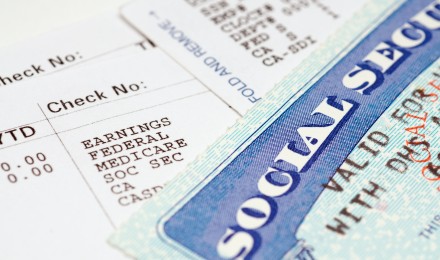Social security is funded by payroll tax, which means that money is taken out of your paycheck in order to fund the retirement program. The total amount of social security tax paid by each worker is normally 12.4 percent of income earned (Medicare is another 2.9 percent). Employers pick up one half of the social security tax for employees, so normally employees have 6.2 percent of their income deducted for social security. Those who are self employed pay the full 12.4 percent themselves.
For the last several years, however, employees have not been paying their full 6.2 percent. In December of 2010, a payroll tax holiday was put into effect as an attempt at a stimulus measure to give more American’s money to spend by leaving them more cash in their pockets. The payroll tax holiday replaced the “Making Work Pay Credit” that was in effect for 2009 and 2010. While the payroll tax holiday was in effect, the contribution that Americans had to make to social security was reduced to 4.2 percent from the standard six percent. Although always intended to be temporary, Americans got used to the payroll tax holiday, however, and it came as quite a surprise to many when the holiday expired and a bigger bite was taken out of everyone’s first paycheck in 2013.
The Expiration of the Payroll Tax Holiday
The payroll tax holiday expired as of December 31, 2012 and neither democrats nor republicans took any steps to renew this tax holiday as part of the Fiscal Cliff package or other budget negotiations that have been going on all year. As such, the amount that American workers must pay in social security tax increased back up to 6.2 percent. This was seen as a two percent tax increase by many, although it was actually a return to what people used to pay before and a potentially necessary return in order to try to prolong the viability of the social security system which many people are concerned is slowly going broke.
Social security taxes are not withdrawn on all income but instead there is a maximum cap. For 2013, the social security income cap for each worker is $113,700. This means that the 6.2 percent is paid only on the first $113,700 in income for each individual worker. Some believe that this makes the tax a regressive one that hits lower and middle class workers harder than the rich who do not pay social security taxes on their entire income. However, there are also benefit caps as well and social security was not intended to be a form of welfare or redistribution but instead was meant as a social safety net for everyone to pay into and receive benefits from.
With the maximum cap in place, the maximum tax increase that could result from the payroll tax holiday expiration is $2,274 for a worker earning $113,700 or more. The Tax Policy Center in Washington, however, indicates that the average worker will have a tax bill that is around $700 higher thanks to the expiration of the tax holiday. For a household with a combined total income of $50,000, around $1,000 more in taxes will be paid over the course of the year.
Unfortunately, while this may not seem like a lot, many struggling families are also dealing with rising gas costs and health insurance premiums, so the expiration of the payroll tax holiday could have a profound impact on those barely coping with their bills as it is.
Social security is funded by payroll tax, which means that money is taken out of your paycheck in order to fund the retirement program. The total amount of social security tax paid by each worker is normally 12.4 percent of income earned (Medicare is another 2.9 percent). Employers pick up one half of the social security tax for employees, so normally employees have 6.2 percent of their income deducted for social security. Those who are self employed pay the full 12.4 percent themselves.
For the last several years, however, employees have not been paying their full 6.2 percent. In December of 2010, a payroll tax holiday was put into effect as an attempt at a stimulus measure to give more American’s money to spend by leaving them more cash in their pockets. The payroll tax holiday replaced the “Making Work Pay Credit” that was in effect for 2009 and 2010. While the payroll tax holiday was in effect, the contribution that Americans had to make to social security was reduced to 4.2 percent from the standard six percent. Although always intended to be temporary, Americans got used to the payroll tax holiday, however, and it came as quite a surprise to many when the holiday expired and a bigger bite was taken out of everyone’s first paycheck in 2013.
The Expiration of the Payroll Tax Holiday
The payroll tax holiday expired as of December 31, 2012 and neither democrats nor republicans took any steps to renew this tax holiday as part of the Fiscal Cliff package or other budget negotiations that have been going on all year. As such, the amount that American workers must pay in social security tax increased back up to 6.2 percent. This was seen as a two percent tax increase by many, although it was actually a return to what people used to pay before and a potentially necessary return in order to try to prolong the viability of the social security system which many people are concerned is slowly going broke.
Social security taxes are not withdrawn on all income but instead there is a maximum cap. For 2013, the social security income cap for each worker is $113,700. This means that the 6.2 percent is paid only on the first $113,700 in income for each individual worker. Some believe that this makes the tax a regressive one that hits lower and middle class workers harder than the rich who do not pay social security taxes on their entire income. However, there are also benefit caps as well and social security was not intended to be a form of welfare or redistribution but instead was meant as a social safety net for everyone to pay into and receive benefits from.
With the maximum cap in place, the maximum tax increase that could result from the payroll tax holiday expiration is $2,274 for a worker earning $113,700 or more. The Tax Policy Center in Washington, however, indicates that the average worker will have a tax bill that is around $700 higher thanks to the expiration of the tax holiday. For a household with a combined total income of $50,000, around $1,000 more in taxes will be paid over the course of the year.
Unfortunately, while this may not seem like a lot, many struggling families are also dealing with rising gas costs and health insurance premiums, so the expiration of the payroll tax holiday could have a profound impact on those barely coping with their bills as it is.







